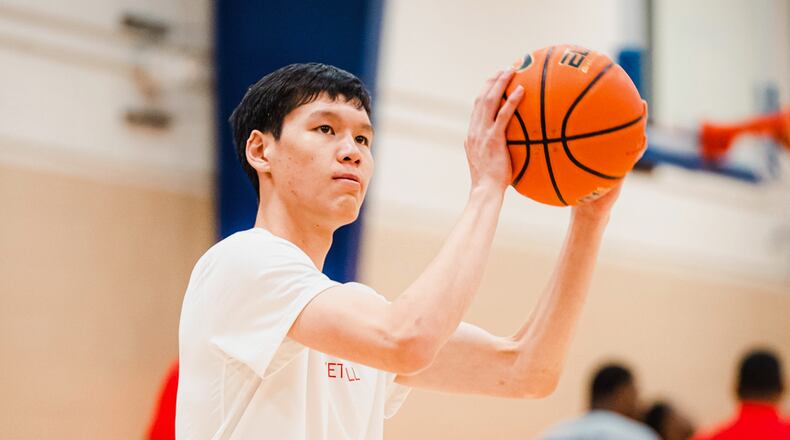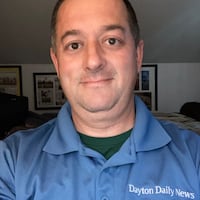That left the returning starter, Malachi Smith, and Kobe Elvis, who took over Smith’s spot in the two NIT games when Smith was sidelined by an ankle injury, as the only two returning point guards on the roster, though Elvis doesn’t play the position when Smith’s in the game. Joining the mix, however, is 6-foot-8 freshman Mike Sharavjamts.
Sharavjamts arrived on campus on June 15. He’s one of the 11 scholarship players participating in summer practices. Richard Amaefule, who redshirted last season, has been sidelined by an injury. Sharavjamts’ teammates have had enough time now to get a sense of what he can do.
“He can do it all,” Elvis said. “I’ve already seen him play a little bit of the point. I’ve seen him show us how how good of a passer he really is.”
“To be that tall and to be doing what he’s doing as a freshman, he’s doing pretty good,” forward DaRon Holmes II said. “We all still have things to work on, but he’ll learn the system and I think he’s going to do a great job.”
Dayton needs the depth. The long season always brings injuries plus many bumps and bruises. Smith and Elvis both almost missed the road game at Rhode Island last season with injuries. They rallied to help lead Dayton to a 63-57 victory.
Elvis battled an ankle injury all season, playing through the pain. He said it slowed him down and limited his practice time late in the season. Koby Brea had a similar issue with his shoulder most of the season. He suffered the injury in the game against Kansas in November when a pump fake resulted in Remy Martin’s hitting his shoulder. He said it was never 100 percent the rest of the season.
That threat of injuries means Dayton needs insurance at all positions. That’s why the development of Sharavjamts, a top-100 recruit in the class of 2022 and the only freshman on the roster, is important.
“I feel like even at the pro level you don’t see somebody his height doing what he does,” Brea said. “He has a tremendous feel for the game, and just from the workouts alone, you can see that he has a lot of potential. It’s just about getting that experience playing at the college level. It’ll probably take him a couple of games to figure it out. But the coaches do a good job, too, and they stay on top of him and make sure he’s doing the right thing. He has that feel for the game and that IQ and that passing ability, and everything he does is extremely athletic, too. He can do it on both ends, and that’s tremendous for us.”
If Smith stays healthy, they won’t need many minutes from the backup point guards. He averaged 31.0 minutes as a freshman but 33.3 minutes in Atlantic 10 Conference play. He played 37 or more minutes six times in league play. Brea thinks Dayton has enough depth at point guard.
“They’ve been developing Kobe at the point guard position more now,” Brea said, “So I feel like he’ll be able to get some of those minutes at the one and, of course, Mike as well. With Mike, I feel like he’s a big help because we can put a big lineup out on the floor, and it makes it really hard on both ends, especially defensively, with all that length. It could be trouble for the other team. It’ll be really interesting to see how they develop him and how they develop the point guard position itself, but I feel we’ll be really good at the one.”
Elvis took over the point guard position in the second half against Richmond in the A-10 tournament semifinals when Smith sprained his ankle just before halftime. Elvis tallied 18 assists and eight turnovers in the Richmond game and the two NIT games against Toledo and Vanderbilt.
While Elvis continues to get repetitions at the two spot in practice next to Smith and the other returning starters — Holmes, Toumani Camara and R.J. Blakney — he’s also working at the one. He expects the rotation in the 2022-23 season to look similar to what it did last year with that group starting the game and then him taking over for Smith, when he needs a rest, at point guard at times during the game.
The postseason experience should help Elvis when he does play the point.
“I think it really showed me areas where I needed to grow,” Elvis said. “I needed to get better on the ball. I needed to really be more vocal with my teammates. I needed to lead in a different way. Because usually with Mali and Toumani out there, they’re more vocal and I’m able to kind of take a backseat in those areas, but it really showed that I need to use my voice a lot more and help lead.”
About the Author

